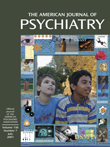Meta-Analysis of the Association Between the 7-Repeat Allele of the Dopamine D4 Receptor Gene and Attention Deficit Hyperactivity Disorder
Abstract
OBJECTIVE: Family, twin, and adoption studies show attention deficit hyperactivity disorder (ADHD) to have a substantial genetic component. Although several studies have shown an association between ADHD and the 7-repeat allele of the dopamine D4 receptor gene (DRD4), several studies have not. Thus, the status of the ADHD-DRD4 association is uncertain. METHOD: Meta-analysis was applied to case-control and family-based studies of the association between ADHD and DRD4 to assess the joint evidence for the association, the influence of individual studies, and evidence for publication bias. RESULTS: For both the case-control and family-based studies, the authors found 1) support for the association between ADHD and DRD4, 2) no evidence that this association was accounted for by any one study, and 3) no evidence for publication bias. CONCLUSIONS: Although the association between ADHD and DRD4 is small, these results suggest that it is real. Further studies are needed to clarify what variant of DRD4 (or some nearby gene) accounts for this association.



